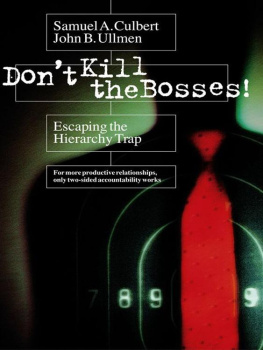Samuel Culbert - RADICAL MANAGEMENT
Here you can read online Samuel Culbert - RADICAL MANAGEMENT full text of the book (entire story) in english for free. Download pdf and epub, get meaning, cover and reviews about this ebook. year: 1985, publisher: The Free Press, genre: Politics. Description of the work, (preface) as well as reviews are available. Best literature library LitArk.com created for fans of good reading and offers a wide selection of genres:
Romance novel
Science fiction
Adventure
Detective
Science
History
Home and family
Prose
Art
Politics
Computer
Non-fiction
Religion
Business
Children
Humor
Choose a favorite category and find really read worthwhile books. Enjoy immersion in the world of imagination, feel the emotions of the characters or learn something new for yourself, make an fascinating discovery.

- Book:RADICAL MANAGEMENT
- Author:
- Publisher:The Free Press
- Genre:
- Year:1985
- Rating:5 / 5
- Favourites:Add to favourites
- Your mark:
- 100
- 1
- 2
- 3
- 4
- 5
RADICAL MANAGEMENT: summary, description and annotation
We offer to read an annotation, description, summary or preface (depends on what the author of the book "RADICAL MANAGEMENT" wrote himself). If you haven't found the necessary information about the book — write in the comments, we will try to find it.
RADICAL MANAGEMENT — read online for free the complete book (whole text) full work
Below is the text of the book, divided by pages. System saving the place of the last page read, allows you to conveniently read the book "RADICAL MANAGEMENT" online for free, without having to search again every time where you left off. Put a bookmark, and you can go to the page where you finished reading at any time.
Font size:
Interval:
Bookmark:
RADICAL MANAGEMENT
Power Politics and the Pursuit of Trust
Samuel A. Culbert
John J. McDonough

THE FREE PRESS
A Division of Macmillan, Inc.
NEW YORK
Collier Macmillan Publishers
LONDON
Copyright 1985 by The Free Press
A Division of Macmillan, Inc.
All rights reserved. No part of this book may be reproduced
or transmitted in any form or by any means, electronic or
mechanical, including photocopying, recording, or by any
information storage and retrieval system, without permission
in writing from the Publisher.
The Free Press
A Division of Macmillan, Inc.
866 Third Avenue, New York, N.Y. 10022
www.SimonandSchuster.com
Collier Macmillan Canada, Inc.
Printed in the United States of America
printing number
1 2 3 4 5 6 7 8 9 10
Library of Congress Cataloging in Publication Data
Culbert, Samuel A.
Radical management.
I. Management.
I. McDonough, John J. (John Joseph).
II. Title.
HD31.C8 1985 658 85-10150
ISBN 0-02-905940-2
eISBN-13: 978-1-439-13850-2
ISBN-13: 978-0-029-05940-1
With love to
Anne, John, and Elaine
and to
Charles, Gar, Samantha, and Mary
Once again we claim to have written our last book. We think this one takes an essential step in communicating our message broadlythat there is an inherently political dimension to ones everyday participation at work and that this dimension requires constant monitoring and attention. Were hoping that our thesis becomes a reference that people will point to in specifying the type of sensitivity and consciousness they would like to see added in the workplace. Our logic flows like this:
- Trusting relationships are a necessary condition for the long-term effectiveness of any organization.
- The Human Relations people were right, communication skills and empathy are the keys to trusting relationships.
- But, before good communications leading to trusting relationships are possible, one first has to recognize the political forces that are inherent in any situation, and then one must deal skillfully with them.
Our book is about the political dynamics inherent in every organizational situation and what needs to be understood before people can form trusting relationships. When the politics are not addressed, good intentions and good-enough communication skills dont work. The resulting structure simply makes it impossible for people to form trusting relationships. And we find that what most people understand about the political forces that accompany any organizational situation wouldnt fill the proverbial thimble.
This book is written for accomplished managers, prospective managers, and academics alike. We are management educators who, through our consulting and involvement in the business community, have developed perspectives that add a missing dimension to the practical, analytic, bottom-line-oriented thinking that managers use today. We are also researchers whose mode of inquiry has led to a theory and distinctive viewpoint that we would like to have known and appreciated by our peers. And we are university professors with concerns that our students acquire the perspectives needed to succeed in established organizations, and on terms that are personally meaningful to them.
In writing this book, as well as the two that preceded it, we gave a great deal of thought to identifying a mode of presentation that would appeal to our three target audiences simultaneously. At the same time, we wanted to observe the tenets of thoughtful clinical inquiry and to put our ideas in a form to which experienced managers could personally relate and that newcomers could visualize and understand. Of course we also sought a lively presentation mode that would hold peoples interests, for we recognized that our perspective requires immersion in an interlocking set of concepts that are not easily broken down into a discrete and linear list of ideas.
For us, the common denominator is each individuals own personal experience. We present, as our format for analysis and documentation, case situations and work-life vignettes selected for their ability to illustrate our points in contexts to which people in different situations can personally relate. After all, when it counts, personal experience is what people rely on anyway. Personal experience is what accomplished managers rely on when under pressure, proceeding in waters they deem hazardous, and it is what academic researchers fall back on when encountering theories with conflicting, and substantiated, conclusions. Whats more, we find that this is what the management neophyte trusts. While our students lack work experience, they all have life experiences that in their minds parallel what they anticipate facing when they begin their professional work.
Of course everyone knows that there is no way of presenting a case or of describing an organization event that is totally objective or will accurately reflect the observations and experience of each person who witnessed it. This is the well-documented Rashomon effect. Each participant sees events differently and ascribes different meanings to what he or she observes. So while we do our best to present accounts that portray situations as we actually witnessed them, we do not base the validity of our conclusions on any assumption that another team of viewers would see the same events exactly as we describe them, or interpret their meaning as we did, or even that they would choose the same event to make the point we selected it to illustrate.
The validation for what we assert rests in the mind of each reader. Does what we assert and our illustration of it fit with your experience? Do you find our conclusions plausible? Do you see parallels in your own life and in your own work experiences to what we have seen and assert? And, most important, do our perspectives help you to see facets of familiar events that you have previously missed and do you believe what we have concluded will help you deal more effectively with the organization events you face tomorrow?
We contend that what we have to saythe perspectives we draw from the situations we relate and the theories we illustrate with themshould stand the test of each readers personal experience. If it does, our viewpoint has passed one of the most crucial tests of scientific credibility. We invite readers to reflect on the events we describe and to relate them to their own experiences, whatever those experiences may have been, with all the idiosyncratic and special biases in interpretation that one gives to them, and to conduct their own tests of validity. What we assert should either prove personally valid or it should be discarded.
However, keep in mind that people can sometimes be deceived by their experience. Every culture and organization socializes its members to receive their experience in mainstream categories that do not accurately represent ones personal reaction. For instance, in the 1970s there were groups of people, even entire companies, who thought that a managerial technique called management-by-objectives could enforce responsible participation. This technique became valid to the extent that an estimated 40 percent of the Fortune 500 companies instituted management effectiveness programs based on it. And in the 1980s the majority of these programs have fallen by the wayside, leaving many who participated more aware of its flaws than its strengths. Yes, it is possible to convince an entire group of a fact that later becomes invalid. So while we encourage people to use their own experience as a base, we also caution them not to rubber stamp their subjective reactions.
Next pageFont size:
Interval:
Bookmark:
Similar books «RADICAL MANAGEMENT»
Look at similar books to RADICAL MANAGEMENT. We have selected literature similar in name and meaning in the hope of providing readers with more options to find new, interesting, not yet read works.
Discussion, reviews of the book RADICAL MANAGEMENT and just readers' own opinions. Leave your comments, write what you think about the work, its meaning or the main characters. Specify what exactly you liked and what you didn't like, and why you think so.











![Samuel Beckett [Samuel Beckett] - The Complete Dramatic Works](/uploads/posts/book/72751/thumbs/samuel-beckett-samuel-beckett-the-complete.jpg)